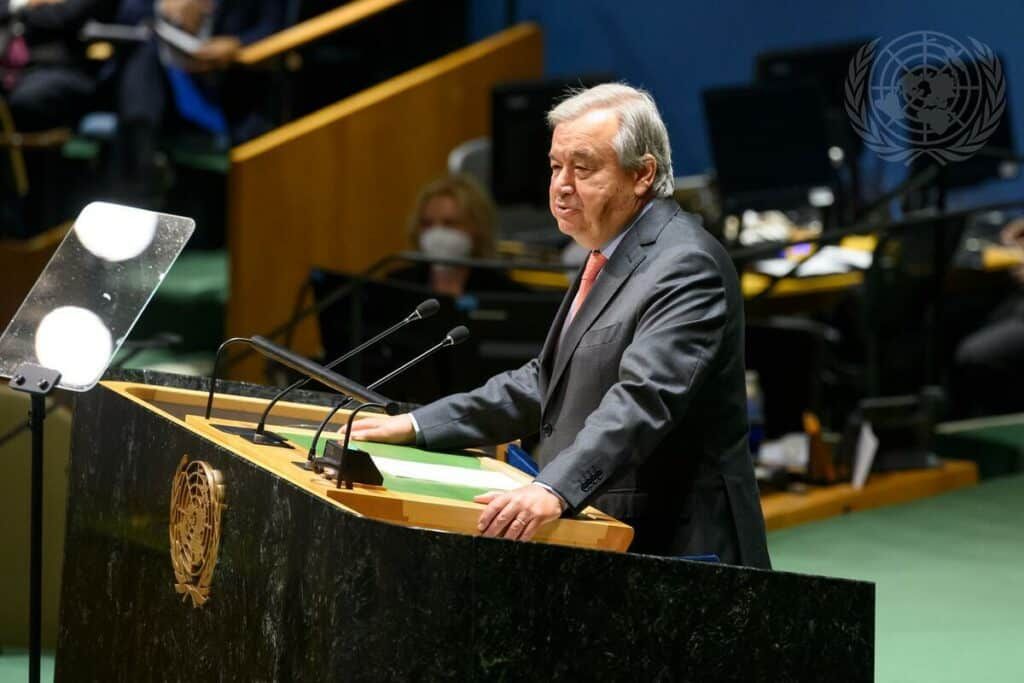NPT Review Conference: Will it rise to the proliferation challenges?
By François Diaz-Maurin | August 3, 2022
 UN Secretary-General António Guterres delivers remarks at the opening meeting and commencement of general debate of the Tenth Review Conference of the Parties to the Treaty on the Non-Proliferation of Nuclear Weapons (NPT). The NPT Review Conference is being held at UN headquarters in New York on August 1-26, 2022. (Image UN Photo/Loey Felipe)
UN Secretary-General António Guterres delivers remarks at the opening meeting and commencement of general debate of the Tenth Review Conference of the Parties to the Treaty on the Non-Proliferation of Nuclear Weapons (NPT). The NPT Review Conference is being held at UN headquarters in New York on August 1-26, 2022. (Image UN Photo/Loey Felipe)
“Today, humanity is just one misunderstanding, one miscalculation away from nuclear annihilation.”
This is how UN Secretary-General António Guterres opened the Tenth Review Conference of the Parties to the Treaty on the Non-Proliferation of Nuclear Weapons (NPT) this week in New York. Guterres’ remarks could hardly have been more alarming. “[C]rises—with nuclear undertones—are festering. From the Middle East and the Korean Peninsula. To the invasion of Ukraine by Russia, and to many other factors around the world. … All of this [happens] at a time when the risks of proliferation are growing and guardrails to prevent escalation are weakening,” the Secretary-General said.
Initially scheduled for 2020 but delayed due to the global COVID-19 pandemic, this year’s NPT Review Conference comes amid a clouded summer of potential nuclear proliferation. North Korea’s expected next nuclear test would put an end to a self-imposed testing moratorium initiated in 2017. Iran has resumed construction activities at its underground nuclear complex and turned off surveillance cameras at its nuclear sites, moves that could put it only a few months away from amassing the fissile material needed for a nuclear bomb. Saudi Arabia’s nuclear power plans—which apparently include enriching uranium with up to 20 percent of the fissile isotope uranium 235, higher than needed for commercial nuclear power reactors—suggest it may also have an interest in a nuclear weapons program. Sweden has fast-tracked its NATO membership application, raising concerns that the country might change its position toward nuclear weapons after it joins the alliance. And the potential transfer of nuclear weapons-grade, highly enriched uranium to Australia as part of its submarine deal with the United States and the United Kingdom would set a precedent that could enable the proliferation of nuclear technology in other countries.
But the glowing elephant in the room at this year’s NPT Review Conference is Russia’s invasion of Ukraine and its impact on the global nuclear order. In late June, Russian President Vladimir Putin and the President of Belarus, Alexander Lukashenko, met to discuss the deployment of Russian non-strategic nuclear weapons in Belarus—an effort that would mirror NATO’s nuclear-sharing arrangements. Also, Russia’s attack on Ukraine violated the security assurances Moscow gave in the so-called Budapest Memorandum of 1994, which led to the transfer of nuclear warheads in Ukraine to Russia as the Soviet Union dissolved. It’s a violation that could well undermine attempts to use security assurances as a tool in non-proliferation efforts. Ahead of the NPT Review Conference, Russian President Vladimir Putin told participants that “a nuclear war cannot be won and must never be fought,” borrowing from the famous statement by Ronald Reagan and Mikhail Gorbachev. Given the variety of Russian nuclear threats made before and during the Ukraine invasion, it is hard to tell whether Putin’s message convinced anyone at the NPT Review Conference of Russia’s peaceful intentions.
The lack of a shared and steadfast commitment to nuclear disarmament could prevent NPT Review Conference participants from reaching significant agreements. A possible harbinger of inaction was the first meeting of states parties of the Treaty on the Prohibition of Nuclear Weapons (TPNW) last month in Vienna, where participants could not even agree on calling out Russia’s nuclear threats and rhetoric in the context of its invasion of Ukraine.
The NPT Review Conference continues at UN headquarters in New York through most of August. Colloquially referred to as the RevCon, the meeting—held every five years—has been the main international forum on nuclear non-proliferation and disarmament since the treaty entered into force in 1970. The parties gathered in New York have one month to agree on a set of measures that aim, as Guterres put it, “to lift the cloud of nuclear annihilation, once and for all.” It is probably an understatement to say that such an overarching result is unlikely to be reached.
Together, we make the world safer.
The Bulletin elevates expert voices above the noise. But as an independent nonprofit organization, our operations depend on the support of readers like you. Help us continue to deliver quality journalism that holds leaders accountable. Your support of our work at any level is important. In return, we promise our coverage will be understandable, influential, vigilant, solution-oriented, and fair-minded. Together we can make a difference.
Keywords: NATO, NPT, NPT Review Conference, Non-Proliferation Treaty, Putin, Russia, TPNW, Ukraine, United States, arms control, nuclear disarmament, nuclear policy, nuclear proliferation, nuclear risk, nuclear threats, nuclear war, nuclear weapons, security assurances, uranium enrichment, world nuclear order
Topics: Nuclear Weapons
















The Open Letter to the NPT States Parties endorsed by over 1400 political, diplomatic, military, and religious leaders as well as experts and activists, aims slightly lower than the UNSG, but any lower and it is unlikely the non-nuclear-weapon states will buy it. For over half a century they have refrained from acquiring nuclear weapons while the nuclear-weapon states blithely continue to acquire at will. This despite the treaty pledge to achieve cessation of the nuclear arms race “at an early date.”
In the modern rules-based international order, the same rules should be applied equally to every state, no?